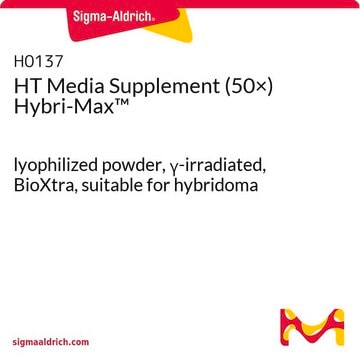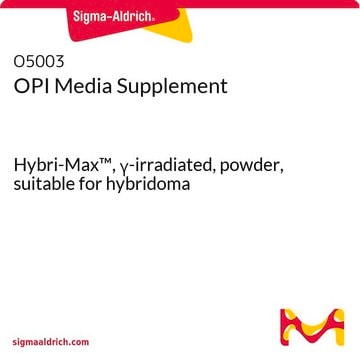推荐产品
一般說明
The Hybridoma Subisotyping Kit is intended for the detection and identification of mouse monoclonal antibody subclasses IgG1, IgG2a, IgG2b, IgM and IgA in supernatants. It is also used for confirmation of monoclonality of cloned hybridoma cultures. This double antibody detection system is a highly sensitive enzyme immunoassay method incorporating specific primary antisera. Assay sensitivity is less than 1 µg/ml and can be reliably used with diluted culture supernatants. The following protocol utilizes 50 µl X 7 (350 µl) of each supernatant tested (a 1:2 dilution occurs as each sample is added to diluent in each well). When supernatant medium is precious, the medium from high producer cells can be diluted much more (1:10 or greater), with appropriate modifications in the Application of Supernatants section. When used as directed, the reagents in this kit will be sufficient for 900 determinations or 150 clones
Useful to confirm the purity of cell lines in monoclonal antibody development assays. Sufficient to perform 900 assays (150 clones).
成分
Antibodies to IgA, IgG₁, IgG2a, IgG2b, IgG₃, IgM, anti-mouse peroxidase conjugate, TMB substrate solution, PBS concentrate, surfactant, and a user protocol.
警告
Toxicity: Multiple Toxicity Values, refer to MSDS (O)
儲存和穩定性
Upon arrival store the entire contents of the kit at 4°C.
法律資訊
CALBIOCHEM is a registered trademark of Merck KGaA, Darmstadt, Germany
訊號詞
Warning
危險聲明
危險分類
Eye Irrit. 2
儲存類別代碼
10 - Combustible liquids
Hua Li et al.
Molecular therapy : the journal of the American Society of Gene Therapy, 17(7), 1215-1224 (2009-04-16)
Hepatic adeno-associated virus (AAV)-serotype 2-mediated gene transfer results in sustained transgene expression in experimental animals but not in human subjects. We hypothesized that loss of transgene expression in humans might be caused by immune memory mechanisms that become reactivated upon
我们的科学家团队拥有各种研究领域经验,包括生命科学、材料科学、化学合成、色谱、分析及许多其他领域.
联系技术服务部门








